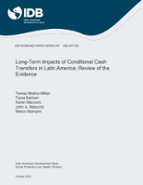Long-term Impacts of Conditional Cash Transfers in Latin America: Review of the Evidence
Date
Oct 2016
We review the literature on the long-term impacts of Conditional Cash Transfer (CCT) programs in Latin America. Long-term impacts are defined as those that both: 1) are related to the accumulation of human capital, and; 2) are observed after beneficiary children have reached a later stage of the life-cycle. We focus on two life-cycle transitions. The first is children exposed to CCTs in utero or early childhood, who have then transitioned to school ages. The second is children exposed to CCTs during school ages, who have then transitioned to early adulthood. The evidence is inconclusive. The experimental literature finds consistent positive long-term effects on schooling, as well as some positive impacts on cognitive skills and learning, socioemotional skills and off-farm employment and income. However, many other estimates are not statistically different from zero and it is often not possible to discern whether this is due to lack of impact or to methodological shortcomings in theevaluation studies. Non-experimental evidence also is mixed. Developing further opportunities for analyses with rigorous identification strategies for the measurement of long-term impacts should be high on the research agenda. As original beneficiaries continue to age, this should also be increasingly possible.



